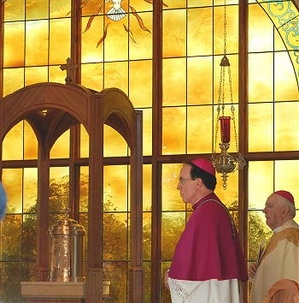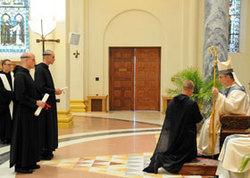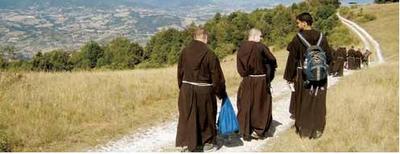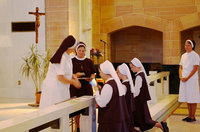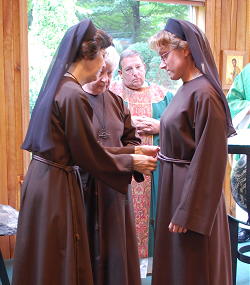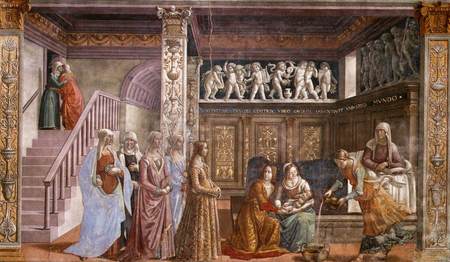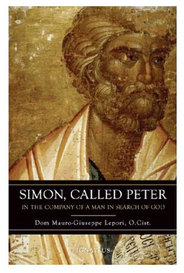Father Thomas Rosica, CSB, head of Canada’s Salt and Light Television invests us with an excellent sense of who John Henry Cardinal Newman was as a person and as a priest in a video presentation. Watch Father Rosica’s fine introduction to Newman or read the transcript here.
Is following Christ worth it?
Is it worth it to follow Christ? Think about that for a minute – Is it worth it to follow Christ? Imagine I was sincere “seeker” asking you that question, how would you respond in concrete ways? (If your answer is yes, why? If your answer is no, why?)
Communion and Liberation on “Islamophobia and Mother Teresa”
The following flyer is being distributed by the lay ecclesial movement Communion and Liberation this weekend as a humble attempt to understand, in a serious way, what the Ground Zero-Mosque building proposal means in light of our saying we believe that Jesus Christ makes a difference in the way we live and see reality around us, and how He is truly present among us. If we really believe that Christ abides with us, then how do you (we) evaluate value of the current Christian-Muslim-unbeliever tensions? Do we, as believers, assess reality according to the way everyone else does, or do we Christians assess reality in a new way, in the way Christ sees reality?
The proposed construction of an Islamic center and mosque at
Ground Zero has resulted in the outrage of many Americans and the recent public
discussion about “Islamophobia” in America. These events provoke us to affirm
the following:
1. We notice a growing tendency to manipulate circumstances to
serve as a pretext to create a public furor that demands people make a choice
between one of two pre -packaged, ideological positions. We refuse to engage in
a debate about whether or not to build a mosque at Ground Zero. The reality of
Islam in America brings up questions that go much deeper than that of the
construction of one mosque.
Indeed, one critical and open question is how contemporary American
culture comes to grips with the human person’s religious sense.
2. Many of
those among the cultural elite, as well as many who hold the levers of power in
our nation, have abandoned the religious tradition that informed the lives of
the vast majority of their ancestors: Christianity. They have reduced it to a
moral code or a vague myth, linked to a man dead for more than 2,000 years. Instead,
they have embraced a “scientific” outlook on human life. But science provides
no answer to those questions that continuously gnaw at the human heart, such as
the problem of justice, the meaning of human life, or the problems of suffering
and evil. In fact, science tends to stifle them. Hence, contemporary American culture finds itself weak and
tremendously uncertain about any response to universal human inquiries and
longings.
3. Just over two weeks ago, we marked the 100th anniversary of Mother
Teresa of Calcutta’s birth. One who looks at her sees a resplendent human
person, overflowing with love for everyone, especially strangers of different
religions. Her humanity touched all: religious and atheist; Muslim and Hindu;
rich and poor. Mother Teresa’s life invites anyone who seeks truth to open his
or her heart and mind and take a fresh look at Christianity.
4. For serious
Christians, the challenge of Islam, the large-scale abandonment of
Christianity, the emptiness of the dominant culture, and the witness of Mother
Teresa signal the urgent need for conversion. Pope Benedict XVI recently said
that “conversion…is not a mere moral decision that rectifies our conduct
in life, but rather a choice of faith that wholly involves us in close
communion with Jesus as a real and living Person.” The Pope brings us face to face with the defining difference
between Christianity and Islam: one religion bases its response to the human
person’s religious sense upon a message delivered 1,400 years ago, while the
other offers the experience of a Man who died but is alive and present with us
today. As Fr. Juliàn Carròn,
President of the Fraternity of Communion and Liberation, recently affirmed:
Jesus’ message and even all the miracles He performed were not enough to
overcome the sadness of His disciples on the road to Emmaus –only His risen
presence could ignite their hearts once again.
5. We are not Islamophobic, nor
do we fear our post-modern world.
On the contrary, we invite all to look at Mother Teresa and at the Man
to whom she gave her life. In His
Person, present with us today, all can find the Truth that alone will deliver
the freedom America promises.
Communion and Liberation
September 11, 2010
Notes
Benedict XVI, General Audience,
Paul VI Audience Hall, Wednesday, February 17, 2010 (http://www.vatican.va/holy_father/benedict_xvi/audiences/2010/documents/hf_ben-xvi_aud_20100217_en.html)
cfr. Luke 24: 13-35
Here’s the text for easy printing: CL Sept 11, 2010 Flyer.pdf
Holy Apostles Seminary Chapel dedicated
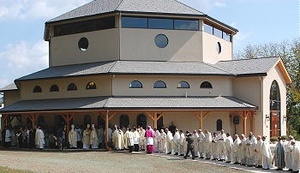 Zacchaeus, make haste, and come down; for today I must abide at thy house. And he made haste, and came down, and received him joyfully into his house. This day is salvation come to this house from the Lord, alleluia.
Zacchaeus, make haste, and come down; for today I must abide at thy house. And he made haste, and came down, and received him joyfully into his house. This day is salvation come to this house from the Lord, alleluia.
Religious life 2010: Profession of vows, entrances and ordinations
- a common prayer life and personal prayer which includes Mass, the Divine Office, Adoration of the Blessed Sacrament, Lectio Divina, the rosary; a daily hour could be optional but there ought to be a good reason why a religious is not making a holy hour more often than not;
- a common vision for living and serving the gospel in the Catholic Church as it is today, not as the Church “was in the 1970s, 1980s, 1990s” or what the Church “should be”; the work done together, whether serving the poor, teaching school, being chaplains needs to cohere to the founding charism, be done together, and with joy in the Risen Lord; serving the gospel and the Church means being faithful to the Church’s teaching authority, which means pastoral authority of the Pope and the bishops;
- a caring fraternal life
- the wearing of a religious habit not only in the house but in public; if you won’t wear the habit in a restaurant or movie theater or any other place, including the airport, then you shouldn’t be there; the wearing of the roman collar for religious orders should be done by exception if there is a legitimate habit available and the lapel pin just doesn’t cut it.
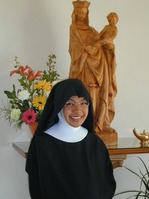
Reclaiming a deeper sensitivity to the sacred Liturgy
Today, the Director of the Liturgical Institute at Mundelein Seminary, Father Douglas Martis, gave the following address today. Father Martis is a priest of the Diocese of Joliet and on the faculty of Mundelein Seminary. Some very useful lessons to keep in mind.
I. Sons.
My Dear Sons,
This was the term used by Fr. Fuller on Monday morning, “sons.” It is a beautiful expression. You are sons to us. Our relationship, despite the distance or proximity of age, is one of father and son, or in certain cases, as with our Director of Music, one of motherly concern. No disrespect to your age or your experience is intended.
We have a common project here, to prepare you for ministry to the Church as priests.
And for those of us concerned directly with your liturgical formation, our project is to prepare you in such a way as to manifest an authentic and profound intelligence of and respect for the Church’s public prayer, so as to demonstrate a true love for God’s people.
This responsibility belongs jointly to you and to us. While it is true that in some ways you are brothers, on another day you will be brothers in a deeper sense. For now, you sons, we love you, and care for you, and want genuinely go give to you what parents give to beloved sons.
What we do, that to which we have committed these years of our lives, is for your good for the good of the Church.
My colleagues and I have strong personalities. We do not have an innate need to challenge you or correct you in order to caress on own self-importance. The program we have of liturgical preparation and celebration, of respecting ritual and integrating prayer, of insisting on music and chant is not the imposition of our own puny personal preferences.
Our teaching is derived from the desire of the Church herself: rooted inSacrosanctum concilium, the ritual books that are the fruit of the Council, and the Church’s liturgical theology.
It is neither our interest nor our agenda to promote our opinions as if they carried the authority of the Church. Our desire is to present you with the Church’s teaching, for love of you and love of her.
We want you to follow our example.
II. Change.
Things change. That’s okay.
Get used to it. New classmates, new teachers, new schedules. New prayers, new responsibilities, new living situations. New circumstances, new trends, new conflicts. New joys, new insights, new challenges.
This is the life of a priest in the 21st century.
Learning to navigate change is an essential skill you will need for the rest of your lives.
Let us be clear. God remains the same. Our upset, generally has more to do with what we want,than with the objective reality of the change. This is not about you.
The church of the 1960s saw excitement and enthusiasm, and resistance, too.
In your situation today, learn to appreciate your elders’ excitement, enthusiasm, and resistance. In 2011 you will know the same. Excitement, enthusiasm, and resistance.
Change leads some to heresy or schism.
Avoid the temptation of being captured by the caricatures of the media, whether your news source is FOX or CNN, whether you are a fan of NCReporter or NCRegister whether you get your information from the blogs or from television. Do not allow yourself to get sucked in by the politics of resistance. When change leads to dissemblance, only the devil is served.
As priests, ministers, official representatives of the Church, you have a greater responsibility than settling for, or promoting polemics. Not only that, as a man of prayer, you have–even now!–the responsibility of learning to embrace the beauty, the rich theology, the deep spirituality of the Church’s liturgical prayer.
You can stand aloof as a member of an elite that knows the rich treasure of prayer or having integrated it yourself you can teach, inform, model, and so help others to do the same.
What is needed here is not a so called “pastoral decision” of diluting prayer but a conviction of genuine care, catechesis and formation that raises up the faithful.
This may be the greatest ecclesial moment in your lifetime. Yours is not the only generation to have ever known liturgical change.
“We are not in the same situation as … 1963. One cannot therefore continue to speak of a change as it was spoken of at the time of the Constitution’spublication; rather one has to speak of an ever deeper grasp of the Liturgy of the Church, celebrated according to the current books and lived above all as a reality in the spiritual order.”[i]
…now
the time has come … to publish liturgical books in a form that both testifies to the stability achieved and is worthy of the mysteries celebrated.[ii]”
If the intuition of Pope John Paul II is correct, if the Third Edition of the Roman Missal signals the maturity of liturgical reform, its dignity and stability, then the post-Counciliar church has survived adolescence and provides the opportunity now for a more adult expression of faith. You and I stand on the threshold of this moment!
III. Texts.
The challenge with public prayer has always been to make the words our own. Let us understand then, that the great opportunity afforded us in this moment is not one of changing words. This is about opening a more direct path to the meaning of Catholic worship–a meaning that has always been there and is there even now in the texts we use today.
What, then, are we to do?
Here is the simple prescription:
Take the words,
learn to understand them,
make the connections.
Follow the example of ancient readers:
take the text, do not read it through as if you already understand [this “mystery ever ancient, ever new!”] take the text, dwell there. Abide between the lines.[iii]
“This quality of reading, which enables a reader to acquire a text not simply by perusing the words but by actually making them part of the reader’s self…”[iv] Here is found true blessing.
Know what you are doing. Listen for the biblical narrative. The texts of the Mass were not put there by some malicious committee looking to trip you up. These texts resound with the voice of God’s own Word. Find the origin, search the reference.
I know this is not easy. We live in a culture that does not foster this kind of connection. Contemporary culture thrives on sound bites; idolizes short cuts and Cliffnotes, Sparknotes and books for dummies.
For your part, claim your place in Catholic culture, with its own language and grammar, its own symbols and meaning.
Plunge yourself in a baptism of the Church’s signs. Let the insight of your patristic reading anoint your understanding and illumine your prayer. Open your eyes to what is around, even here on this campus, with its natural beauty, its architectural wonders, its volumes of wisdom, and its varied residents.
A steady diet of this, an habitual practice of attention to everything is an essential preparation for prayer. Collect these insights, engage these people, absorb this environment.
Your responsibility as seminarian, is to learn this, to integrate it; then you must model it for others and teach it to those in your care.
You become a mystagogue.
IV. Now.
This begins now. You do not have to wait. You walk out of this auditorium and cross a threshold.
Let that crossing be the crossing of every threshold.
Let every word of the Mass bring you to a biblical narrative, a theological insight, a pastoral encounter.
Let every sign of the Cross bring you to the mount of the Ascension.[v] Let it be, every time, a wrapping yourself in the Trinity, a conforming yourself to the cross of Christ. May it bring you back to your baptism and forward to your funeral. May it inspire the crosses you may trace some day on the breast of future neophytes, on the foreheads of the anointed, on the palms of priests.
Let every greeting of the Mass resound with the words of the great missionary Paul,[vi] or the salutation of Boaz to harvesters,[vii] or the words of the Risen Christ.[viii]
Let every response, whether it be “And also with you” now or “And with your spirit” at another time, let this reply make us marvel at God’s wisdom in Ordering the Church and in the Spirit’s work of assembling members with different gifts into one holy body.
Let every procession remind us of life’s pilgrimage to heaven; every standing be in implicit imitation of the Great High Priest: “Here I am, Lord. I come to do your will.”[ix] Let every genuflection, every bow be the humble acknowledgement of what God has done for us in Christ Jesus.
Let our stance at the Alleluia be so completely devoted to the praise of Christ present in the Word, that rather than tracking the deacon and registering ritual glitches, our minds, bodies and voices melt into the Eternal.
Let prayers in the preparation of bread and wine, bring us to Daniel’s fiery furnace, so that the words of Azariah become our own: we have nothing else to offer, but with contrite hearts and humble spirits let us be received.[x] And may the dew-laden breeze[xi] that soothed the heat of that inferno, come like dew in the desert,[xii] to provide us with our daily bread.”Priests of the Lord, bless the Lord.” [xiii]
Let every dismissal, GO! bring us back again to Ascension,[xiv] and to every sending of
Christ: “You, too, go to the vineyard!”[xv]
Do you see? At every moment, at every turn, around every corner, the bible is there. A prayer, a doctrine, an insight. And it has been there all along.
All we have, are, do, everything we love… is here.
Learning this. Integrating this. Modeling this. Teaching it is our project.
Will you make it your project too?
Notes
[i] Vicesimus quintus annus, 1988, 14.
[ii] VQA, 20.
[iii] Alberto Manguel: A History of Reading. “You did not read books through; you dwelt, abided between their lines and, reopening them after an interval, surprised yourself at the spot where you had halted.”, 12.
[iv] Manguel, 58.
[v] Mt 28:19.
[vi] 2 Cor 13:13 et al.
[vii] Ruth 2:4.
[viii] Jn 20:19.
[ix] Heb 10:9.
[x] Dan 3:39-40.
[xi] Dan 3:50.
[xii] Ex 16:13-17.
[xiii] Dan 3:84.
[xiv] Mt 28:19.
[xv] Mt 20.D
The fate of Eastern Christianity to be discussed in October; but what about now?
The hard work of collaborating and witnessing to Jesus Christ for 14 million Eastern Christians is indeed a difficult task, but one that is only sustained by prayer, mutuality and study.
Nativity of the Blessed Virgin Mary
On this our liturgical remembrance of Our Lady’s birthday, it is apt to recall what Saint Andrew of Crete, preached:
This is the highest, all-embracing benefit that Christ
has bestowed upon us. This is the revelation of the mystery, this is the emptying-out
of the divine nature, the union of God and man, and the deification of the
manhood that was assumed. This radiant and manifest coming of God to men most
certainly needed a joyful prelude to introduce the great gift of salvation to
us. The present festival –the nativity of the Theotokos– is that prelude, while
the final act is the foreordained union of the Word with flesh. Today the Virgin
is born, tended and formed, and prepared for her role as Mother of God, that
God who is the universal King of all the ages!
With the choirs of saints and angels,
Let the Church be joined as one,
Binding earth to highest heaven,
Praising Jesus, Mary’s Son
Son of God-the Father’s glory
Who took flesh that we might be
Reconciled, reborn, forgiven,
From the pow’r of sin set free!
On this solemn, joyful feast day
Let us sing a song of praise,
Thanking God for Mary’s witness
Faithfully kept all her days.
From her birth to blessed Anna,
Mary listened to God’s word,
And, when summoned by the angel,
Lived in faith what she had heard.
Glory now to God the Father,
Who has made us for his own;
Glory now to Christ our Savior,
Who has raised us to his throne;
Glory now to God the Spirit,
Who renews us in his grace:
Laud and honor, never ceasing,
Be to God from all our race!
J. Michael Thompson
Copyright © 2009, World Library Publications
87 87 D; PLEADING SAVIOR, or IN BABILONE
Blessed Frédéric Ozanam
Prayer for the Canonization of Blessed Frederic Ozanam
God, our Father, You alone have the power to bestow those precious gifts of yours which we rightly call miracles. If it be Your will, be pleased to grant such a gift on behalf of [mention a person’s name here]. We humbly ask that You grant this favor so that Blessed Frederic Ozanam may be canonized by our Holy Mother the Church. We make this prayer through our Lord Jesus Christ, Your Son. Amen.
The name “Frederic Ozanam” may not be well-known to many in the USA, but those who know of or work with the Saint Vincent de Paul Society know well their father in the faith and their founder. Ozanam followed in the foot steps of Saint Vincent de Paul and is a terrific model for all people, particularly the laity because he puts the gospel and the Liturgy into action.
The Saint Vincent de Paul Society has a membership of more than three-quarters of a million people in 47, 000 conferences in 131 countries on 5 continents.
Frederic Ozanam was a married man, a father, well educated, a person who travelled in high society, a man of faith and action. Many people today consider Blessed Frederic to be a precursor to the Second Vatican Council’s vision of the laity in the Church.
Ozanam’s vision of the Church can be seen in an address he gave on the 4 marks of the Church (one, holy, catholic and apostolic). Here is an excerpt of a talk he gave:
One
One only
means of salvation remains to us, that is, that Christians, in the name of
love, interpose between the two camps (of rich and poor) passing like
beneficent deserters from one to the other … communicating mutual charity to
all, until this charity, paralyzing and stifling the egotism of both parties,
and every day lessening their antipathies, shall bid the two camps arise and
break down the barriers of prejudice, and cast aside their weapons of anger and
march forth to meet each other, not to fight but to mingle together in one
embrace, so that they may form but one fold under one pastor.
Holy
Will we be
satisfied to lament the barrenness of the present time, when each bears in his
heart a germ of holiness, which a simple desire would be sufficient to develop?
It we do not know how to love God as the saints did, it is because we see God
with the eyes of faith alone, and faith is so weak. But the poor we see with
the eyes of flesh. They are present. We can put our fingers and our hands into
their wounds, the marks of the crown of thorns are plainly visible on their
heads. There is no place for unbelief here … You poor are the visible image
of the God whom we do not see, but whom we love in loving you.
Catholic
A
Catholic university (Louvain) should be a cause of rejoicing to the Church, to
see raised within her yet another monument to the immortal alliance of Science
and Faith.
Apostolic
You have felt the emptiness of material pleasures, you
have felt the hunger for truth crying out within you; you have gone for light
and comfort to the barren philosophy of modern apostles. You have not found
food for your souls there. The religion of your forefathers appears before you
today with full hands; do not turn away, for it is generous. It also, like you,
is young. It does not grow old with the world. Ever renewing itself, it keeps
pace with progress, and it alone leads to perfection.
More about Blessed Frederic Ozanam can be read here, his chronology, and a brief biography.
Mauro-Giuseppe Lepori –new Abbot General of the Cistercian Order
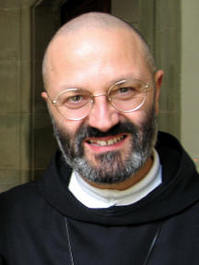 The General Chapter of the Order of Cistercians elected Dom Mauro-Giuseppe Lepori, 52, as their new Abbot General, succeeding Abbot Mauro Estevez. It is reported that Lepori received 109 of 134 votes. His work as abbot general will last for the next 10 years with about 1700 monks and nuns of the Order of Cistercians throughout the world.
The General Chapter of the Order of Cistercians elected Dom Mauro-Giuseppe Lepori, 52, as their new Abbot General, succeeding Abbot Mauro Estevez. It is reported that Lepori received 109 of 134 votes. His work as abbot general will last for the next 10 years with about 1700 monks and nuns of the Order of Cistercians throughout the world.
Abbot Mauro-Giuseppi is the author of Simon, Called Peter: In the Company of a Man in Search of God. The Forward to the book was written by Angelo Cardinal Scola, Patriarch of Venice, a close friend of the late Monsignor Luigi Giussani and who continues to be active in following Communion and Liberation.
A 2003 interview with Abbot Mauro at the CL Rimini Meeting can be read here and a brief article in Traces by the abbot can be read here.
Saints Robert, Alberic, & Stephen, pray for us.
Saint Bernard, pray for us.
Saint Aelred, pray for us.
Saint Alice, pray for us.
Saint Jeanne de Lestonnac, pray for us.
The English Cistercian Martyrs, pray for us.
